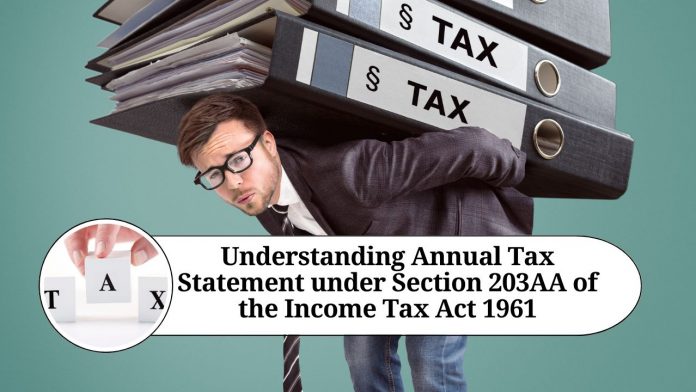As a taxpayer in India, it is important to understand the various provisions of the Income Tax Act. One such provision is Section 203AA, which pertains to the issuance of an annual tax statement. In this blog, we will delve deeper into what this provision entails and how it affects taxpayers.
What is Section 203AA?
Section 203AA of the Income Tax Act 1961 was introduced by the Finance Act, 2012. This section mandates all deductors to issue an annual tax statement to taxpayers who have had tax deducted at source (TDS) from their income. The annual tax statement is essentially a summary of all the TDS deductions made by the deductor for a financial year.
Who is required to issue an Annual Tax Statement?
As per Section 203AA, all deductors who have deducted TDS from a taxpayer’s income are required to issue an annual tax statement. This includes employers, banks, financial institutions, and any other entity that deducts TDS.
What information is included in the Annual Tax Statement?
The annual tax statement issued by the deductor contains the following information:
- Name, address and Permanent Account Number (PAN) of the deductor and the taxpayer
- Details of the TDS deducted, including the amount, date of deduction, and type of income for which it was deducted
- Challan identification number (CIN) or the book entry number in the case of government deductors
- PAN of the deductor and the taxpayer
- Any other information that may be prescribed by the Income Tax Department
When is the Annual Tax Statement issued?
The deductor is required to issue the annual tax statement to the taxpayer on or before the 31st of May of the financial year immediately following the financial year in which the TDS was deducted. For example, if TDS was deducted in the financial year 2022-23, the annual tax statement must be issued on or before 31st May 2024.
What is the importance of the Annual Tax Statement?
The annual tax statement is an important document for taxpayers as it helps them reconcile their tax payments with the TDS deductions made by the deductor. This ensures that the taxpayer has paid the correct amount of tax and avoids any discrepancies or penalties for non-payment or underpayment of taxes. Additionally, it also helps the taxpayer in filing their income tax returns accurately.
Conclusion
Section 203AA of the Income Tax Act 1961 ensures that taxpayers receive an annual tax statement from their deductor, containing all the necessary details of the TDS deductions made from their income. It is important for taxpayers to verify the details in the annual tax statement and reconcile them with their own records to ensure that they have paid the correct amount of tax. Failure to comply with the provisions of this section can attract penalties and other legal consequences.
Read more useful content:
- section 145 of income tax act
- section 10e of income tax act
- section 9 of the income tax act
- section 94b of income tax act
- section 206aa of income tax act
Frequently Asked Questions (FAQs)
Q: What is an annual tax statement?
A: An annual tax statement is a summary of all the TDS deductions made by the deductor for a financial year. It is issued to taxpayers who have had tax deducted at source from their income.
Q: Who is required to issue an annual tax statement?
A: As per Section 203AA, all deductors who have deducted TDS from a taxpayer’s income are required to issue an annual tax statement. This includes employers, banks, financial institutions, and any other entity that deducts TDS.
Q: What information is included in the annual tax statement?
A: The annual tax statement issued by the deductor contains the name, address, and PAN of the deductor and the taxpayer, details of the TDS deducted, including the amount, date of deduction, and type of income for which it was deducted, challan identification number (CIN) or the book entry number in the case of government deductors, and any other information that may be prescribed by the Income Tax Department.
Q: When is the annual tax statement issued?
A: The deductor is required to issue the annual tax statement to the taxpayer on or before the 31st of May of the financial year immediately following the financial year in which the TDS was deducted. For example, if TDS was deducted in the financial year 2022-23, the annual tax statement must be issued on or before 31st May 2024.
Q: Is it necessary to reconcile the annual tax statement with personal tax records?
A: Yes, it is necessary to reconcile the annual tax statement with personal tax records to ensure that the taxpayer has paid the correct amount of tax and to avoid any discrepancies or penalties for non-payment or underpayment of taxes.
Q: What happens if the deductor fails to issue an annual tax statement?
A: If the deductor fails to issue an annual tax statement to the taxpayer, they may be liable for penalties under the Income Tax Act.
Q: Can an annual tax statement be issued after the due date?
A: Yes, an annual tax statement can be issued after the due date with the permission of the Assessing Officer.
Q: Can a taxpayer request a copy of the annual tax statement?
A: Yes, a taxpayer can request a copy of the annual tax statement from the deductor if they have not received it or if they have lost it.




















